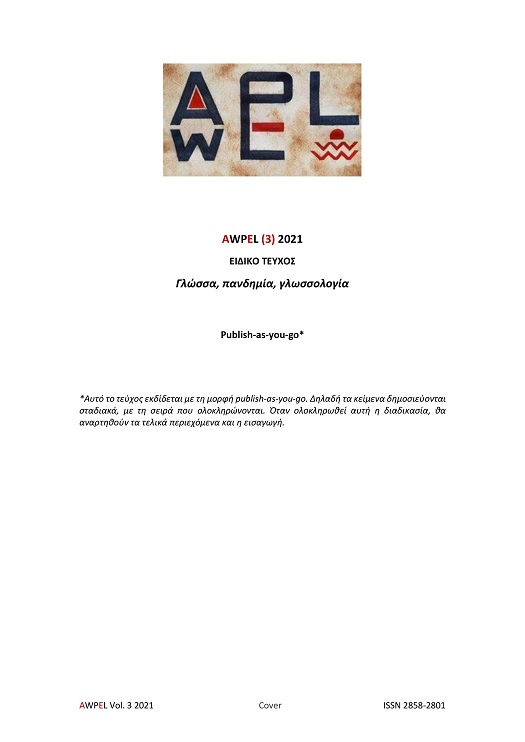The Covid-19 pandemic within a global linguistic landscape: A comparative case study
Abstract
The Covid-19 pandemic has affected all aspects of our lives profusely and irreversibly and has changed the way we experience public spaces. This study aims at portraying instances of linguistic landscapes (LLs) of the pandemic by comparing three very different cities, a provincial Greek town, a developing city in Serbia, and a world metropolis in the U.S. Due to restricted mobility and limited possibilities to carry out fieldwork, the photographic data have been collected by the researcher and trained informants, followed by interviews about opinions/impressions of Covid-19 related language in public spaces. The results show that the three LLs share the expected universal characteristics but also reflect different political, socioeconomic, and cultural idiosyncrasies. My findings also show that (a) LLs seem to lag behind other sources when sharing information and communicating meanings and (b) we appear to rely less on them to guide us as we navigate our cities.
Article Details
- Come citare
-
Mitits, L. (2022). The Covid-19 pandemic within a global linguistic landscape: A comparative case study. Aegean Working Papers in Ethnographic Linguistics, 3, 176–201. Recuperato da https://ejournals.epublishing.ekt.gr/index.php/awpel/article/view/29955
- Sezione
- Articles

TQuesto lavoro è fornito con la licenza Creative Commons Attribuzione 4.0 Internazionale.
Authors who publish with this journal agree to the following terms:
Authors retain copyright and grant the journal right of first publication with the work simultaneously licensed under a Creative Commons Attribution licence that allows others to share the work with an acknowledgement of the work's authorship and initial publication in this journal.
Authors are able to enter into separate, additional contractual arrangements for the non-exclusive distribution of the journal's published version of the work (e.g. post it to an institutional repository or publish it in a book), with an acknowledgement of its initial publication in this journal.
Authors are permitted and encouraged to post their work online (preferably in institutional repositories or on their website) prior to and during the submission process, as it can lead to productive exchanges, as well as earlier and greater citation of published work (See The Effect of Open Access).



